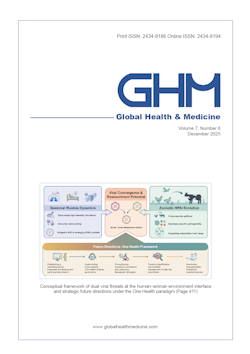Global Health & Medicine 2020;2(2):118-122.
Early cases of COVID-19 in Tokyo and occupational health
Kuwahara K, Hori A, Ohmagari N, Mizoue T
The coronavirus disease 2019 (COVID-19) has spread rapidly across the globe, presenting severe challenges to societies. Gaining a better understanding of patient demographics is essential to develop measures to counteract such spreading. In this context, from a viewpoint of occupational health, we analyzed the publicly available data on patients diagnosed with COVID-19 in Tokyo, which reported the highest number of cases in Japan. A total of 243 cases aged 20 years or older (excluding students) were recorded between January 14 and March 27, 2020. Of 233 cases excluding 10 cases of the first cluster, 162 were men and 176 were of working age (20 to 69 years). Of 203 cases with valid information on employment status, 151 (74%) were workers: 114 employees, 31 self-employed, and 6 medical staff. Of the working patients, the majority were male: 72% in employed and 87% in self-employed. These data suggest the importance of occupational health in controlling the spread of COVID-19. In April 2020, a state of emergency was declared in response to a surge in the number of cases, especially in metropolitan areas. A working schedule associated with lower risks of infection, including telework and flexible working hours, should be rigorously promoted to minimize human-to-human contact. Such policies, along with the implementation of effective measures to protect essential workers from infection, overwork, and stigma, would ensure the smooth running of society amidst the present crisis.
DOI: 10.35772/ghm.2020.01041







